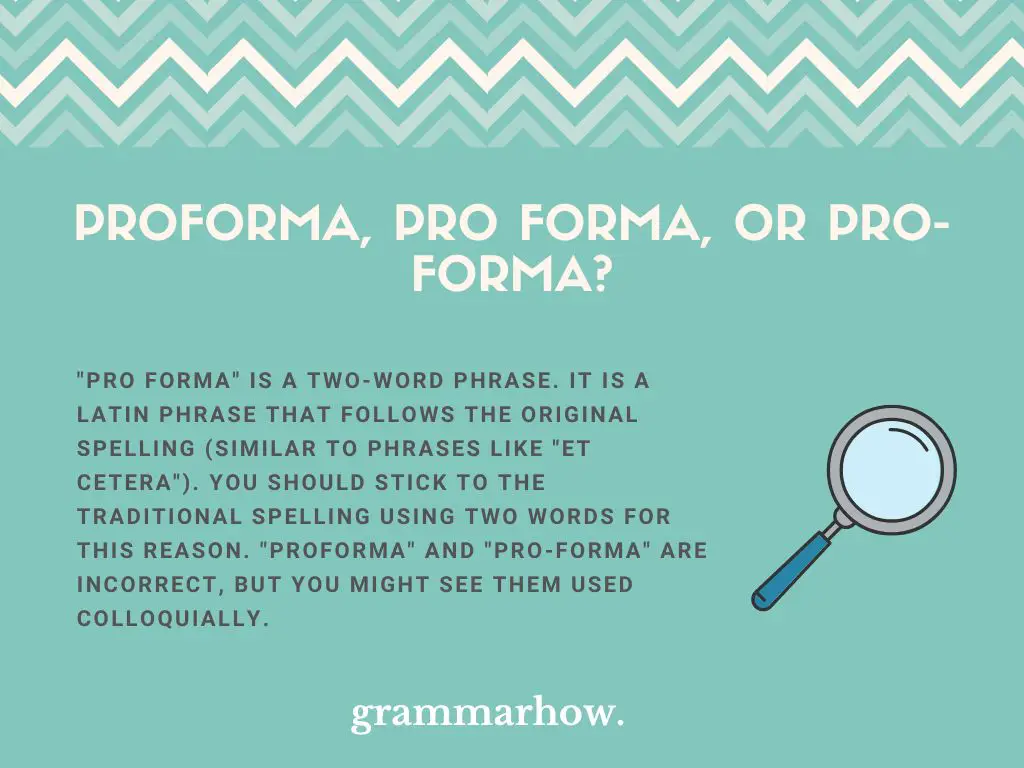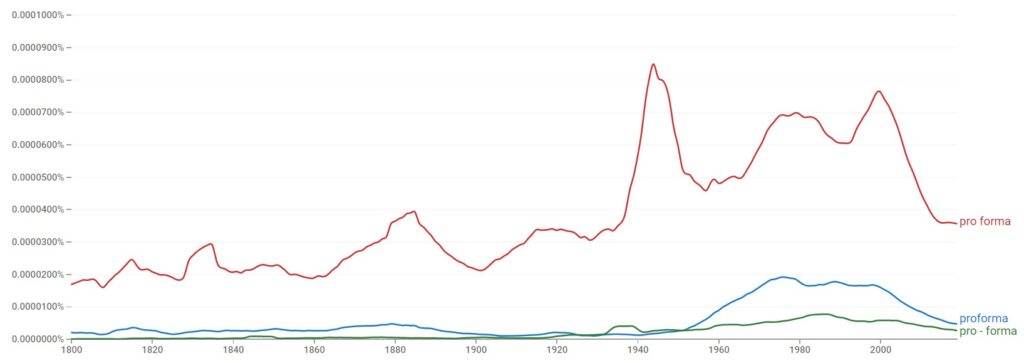“Pro forma” is a Latin phrase that means “as a matter of form.” It works well in many business situations, but you need to know whether it’s written as one or two words (or whether it’s hyphenated). This article will explain what you need to know.
Proforma vs. Pro forma vs. Pro-forma
“Pro forma” is a two-word phrase. It is a Latin phrase that follows the original spelling (similar to phrases like “et cetera”). You should stick to the traditional spelling using two words for this reason. “Proforma” and “pro-forma” are incorrect, but you might see them used colloquially.

According to Google Ngram Viewer, “pro forma” is used much more than the other two variations. This shows that it’s the only one that’s correct in writing. Some people might use “proforma” or “pro-forma” informally, but this isn’t correct if you’re following standard rules.

The Cambridge Dictionary and The Oxford Dictionary list “pro forma” as the only correct spelling. This is true whether it’s used as a noun or adjective, so you have to make sure you keep the two words separate.
Is “Proforma” One Word?
“Proforma” is incorrect when it’s written as one word. There is no reason to group the words because they are part of a traditional Latin phrase. Some people choose to do it because they treat it as a standard compound adjective, but it’s grammatically incorrect to write “proforma.”
Here are some examples to remind you that the two-word option is the only acceptable form:
- Correct: The pro forma invoice isn’t on my table yet. Do you have any idea when I might receive it?
- Incorrect: I thought you were going to sort this out proforma for me? I can’t wait much longer.
- Correct: I need these documents signed pro forma. Please action these immediately.
- Incorrect: I didn’t understand what he meant when he said proforma. Do you have any idea?
- Correct: Pro forma or not, we need to make sure we’re on the same page before doing something like this.
- Incorrect: It’s not proforma if you decide to do something that completely goes against my wishes.
Is “Pro forma” Two Words?
“Pro forma” should always be two words. You do not need to write it as one word or as a hyphenated form because the two-word variation follows the standard Latin rules for the phrase. Whether it’s a phrasal noun or an adjective, it should stay as two words.
The two-word variation looks like this:
- I’m going to need you to sort this out pro forma. I don’t have a lot of time to waste now.
- It’s got to be on a pro forma basis. Do you think you can manage something like that?
- It’s a pro forma declaration, and it’s about time that they started to show me they were loyal.
- I wrote it pro forma this morning. You should have received it already. I’m sorry if you didn’t.
- Can we get the pro forma invoice, please? I feel like you’ve been sitting on it for a while.
Is “Pro-forma” Hyphenated?
“Pro-forma” is not correct when hyphenated. It comes from the original Latin phrase, which does not include a hyphen. Hyphens are a much more recent addition to the English language, so it would be unacceptable to use them with a phrase like “pro forma.”
While AP Style rules teach us to hyphenate two words when they modify a noun, this does not apply to Latin phrases like “pro forma.” Even though “pro forma” is used as an adjective, it should not be hyphenated like standard compound adjectives.
Since you cannot use the hyphenated form, you can refer to these examples:
- Correct: I need you to return this document pro forma. I don’t want anything to change on it, okay?
- Incorrect: I thought they could get the pro-forma invoice done on time, but I was clearly mistaken.
- Correct: I needed the pro forma agreement on my desk by this morning. I’m disappointed it’s not here.
- Incorrect: I thought we were going to discuss this pro-forma. Clearly, I was wrong about that.
- Correct: It should be noted that this should be a pro forma document. It must follow the form.
- Incorrect: It’s pro-forma. Do you understand what that means?
Tip To Remember The Difference
Since only the two-word variation is correct, it would be helpful to know of a good tip to remember this fact.
“Pro forma” is a Latin phrase. It follows all the Latin spellings and rules, meaning that the two words are kept separate by tradition. You should remember that its Latin origin plays a key part in whether it’s hyphenated or not. No Latin phrases like this are hyphenated.

Martin holds a Master’s degree in Finance and International Business. He has six years of experience in professional communication with clients, executives, and colleagues. Furthermore, he has teaching experience from Aarhus University. Martin has been featured as an expert in communication and teaching on Forbes and Shopify. Read more about Martin here.
